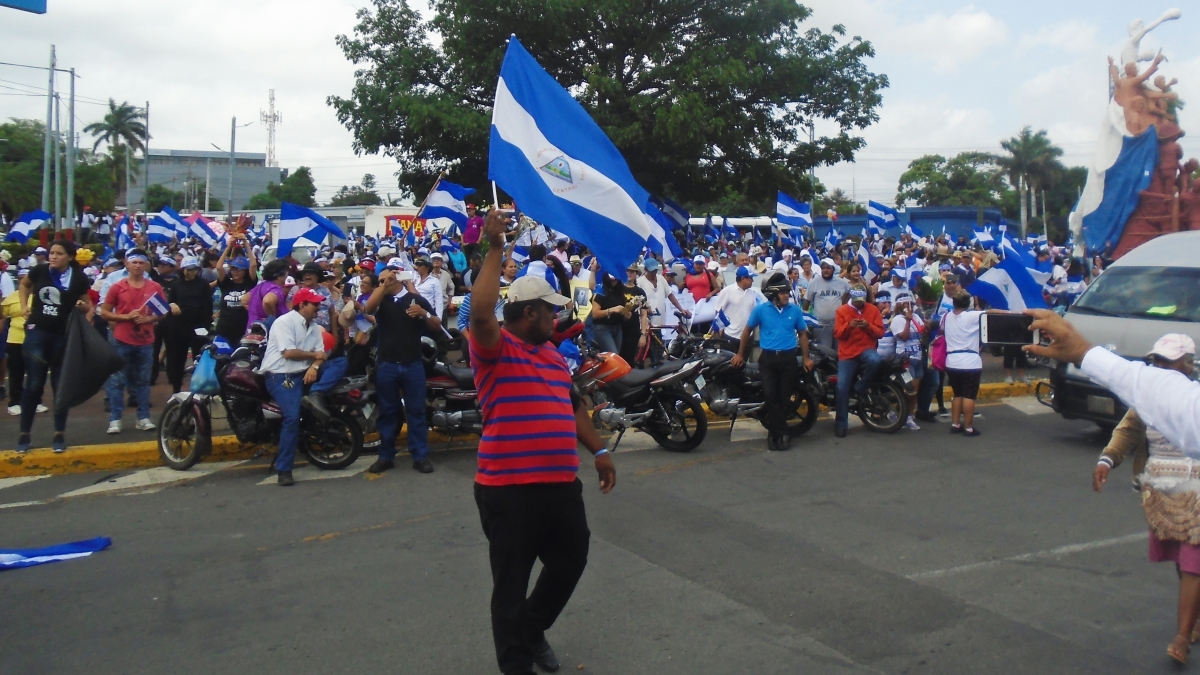ASU expert on violent conflict in Nicaragua

Photo from ASU Instructor Charles Ripley's time in Nicaragua.
In late April, citizens of Nicaragua began protests against President Daniel Ortega when the government announced a social security reform. Now, more than three months later, protesters are asking for Ortega’s resignation. The series of protests have been met with extreme violence, making this the deadliest civil conflict in the country since the end of the Nicaraguan revolution.
Upon his return from visiting Nicaragua this summer, Arizona State University Instructor Charles Ripley agreed to answer questions regarding these protests. Ripley taught for five years at the Jesuit University of Central America in Managua, Nicaragua, and continues to do field work throughout Central and South America.
Question: Why and for how long were you in Nicaragua?
Answer: I lived in Nicaragua for eight years (beginning in 2000) doing a wide range of work for governmental and nongovernmental agencies. I went back to visit for the month of June and the protests against President Daniel Ortega and his powerful wife, Vice President Rosario Murillo Zambrana, exploded. Despite U.S. embassy travel warnings, it was an important time to be there.
Q: The Nicaraguan government’s announcement of an increase in social security last April prompted days of protests that resulted in the plan being dropped. How are the current protests demanding the exit of Ortega different than those back in April?
A: I have witnessed lots of protests in Latin America, particularly in Nicaragua. When I was a professor at the Jesuit Universidad Centroamericana (2000-2005), classes were often canceled due to protests, and once the students even seized the university. Currently, things are different, escalating into a quasi-civil war. Protesters are being met with violence by both official police and riot squad forces, as well as paramilitary groups affiliated with the government. Anti-governmental forces have also committed acts of violence against the police and supporters of the government. The death toll stands at over 400, with hundreds injured, political prisoners, kidnappings (rare previously in Nicaragua) and a destroyed economy.
Q: The protesters have been met with the national police and pro-government groups resulting in extreme violence and many deaths. Do you think we will see a peaceful resolution in the near future?
A: No. The motto for the opposition is “Your mother should give up” (“Que se rinda tu madre!”). No one is giving up. The government and its supporters see themselves as democratically elected. They are in the right fighting against coup plotters (“golpistas”). The opposition sees itself as fighting against a family dictatorship, pejoratively dubbed the “Ortega-Murillo regime.”
The Civic Alliance for Justice and Democracy in Nicaragua, the umbrella group of various opposition movements, carries out marches, builds barricades across the country and even has the power to carry out national strikes (“paros nacionales”). I witnessed the whole country shut down. It was quite a feat! The opposition is also strong with an incredibly large group of dissident Sandinistas who broke with Ortega due to his authoritarian proclivities. Both sides are committed and have the forces to fight well into the future.
Q: Protesters are asking for President Ortega’s resignation, but he stated they should “seek the vote of the people.” Do you expect President Ortega to serve out his current term, which runs through 2021?
A: He has a very good chance at serving his term. He still has a passionate base, though it may be shrinking. Additionally, the opposition fails to concede the benefits the government has afforded the lower classes. One notable example is removing student fees from public schools (“colegios”) and organizing free breakfast and lunch initiatives in which parents would participate by bringing staples such as rice and beans. I witnessed this interesting initiative years ago in different barrios and was actually impressed with its implementation. He is still popular in some sectors.
But possibly more important, this base is extremely well-trained. Ortega still commands respect from former military guerrillas as well as the police and military. When a police station of Masaya was barricaded by an opposition movement for two weeks, the police, riot squad and paramilitaries (evidence of retired soldiers) took it by force to liberate the police commissioner and vast areas of the town. If protesters continue with demonstrations, barricades and strikes, there is a large disposal of former guerrilla forces who can assist the government.
Q: The U.S. Department of State, the United Nations and various nations have condemned this violence. Do you foresee an outside country or agency stepping in to help resolve this conflict?
A: Countries have cut aid and applied other forms of sanctions. A broad range of people and agencies — from leftists like Noam Chomsky and former Uruguayan President José “Pepe” Mujica to the Organization of American States and the United Nations — have denounced Ortega. However, I do not think any country has the will to invade and, as we have seen in various instances, this is not always the optimal policy. It is also important to stress that if the United States did use force, it could backfire and create a rally-around-the-flag-effect for Ortega. In any case, it does not look like any mother is giving up soon!
More Law, journalism and politics

LA journalists and officials gather to connect and salute fire coverage
Recognition of Los Angeles-area media coverage of the region’s January wildfires was the primary message as hundreds gathered at…

A new twist on fantasy sports brought on by ASU ties
A new fantasy sports gaming app is taking traditional fantasy sports and mixing them with a strategic, territory-based twist.…

'Politics Beyond the Aisle' series to explore the stories of public officials
In an effort to build a stronger connection between students and political and civic leaders, Arizona State University’s School…

